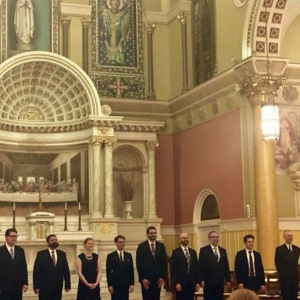 ELEBRATING someone’s 600th birthday is a rare event. To do so over the course of five or six years is an historical rarity. This is what the Blue Heron ensemble and Music Director, Scott Metcalfe have set out to do, performing the complete works of Johannes Ockeghem (c.1420-1497) over the course of thirteen or fourteen concerts that also includes many other composers
ELEBRATING someone’s 600th birthday is a rare event. To do so over the course of five or six years is an historical rarity. This is what the Blue Heron ensemble and Music Director, Scott Metcalfe have set out to do, performing the complete works of Johannes Ockeghem (c.1420-1497) over the course of thirteen or fourteen concerts that also includes many other composers
Refreshing is Metcalfe’s attitude (and public assertion), that he and the ensemble are growing with new insights through this project. Performing concerts that feature many composers in addition to Ockeghem, he states that once the cycle is complete, they might just start all over again “because we are learning so much.”
• Boston Globe review from St. Cecilia Parish, Boston, Thursday, March 1, 2018: Blue Heron continues remarkable journey through Ockeghem.
Widely acclaimed by the New York Times, The New Yorker, The Boston Globe, and others, Blue Heron is shining the light on music that is rarely performed despite being on par with the greatest of all time. Metcalfe asserts, “He is in every way a composer of Bach’s stature and accomplishment both technically and expressively, someone whose music is rich at every level.” Called “the Bach of the 15th Century” Metcalfe also reminds us that Bach is truly “the Ockeghem of the 18th Century.”
The rich inventiveness of Ockeghem’s counterpoint is certainly a high point of all of Western Music. Blue Heron animates these heights with pristine clarity and passion.
* * Listen to a recent broadcast on WCRB FM of a live performance at First Church in Cambridge, Massachusetts here.
* * Listen to Blue Heron and Scott Metcalfe compare Ockeghem to Bach:
* * Listen to here to the Credo from Missa Ecce ancilla domini by Ockeghem:
With a recent performance at St. Cecilia Church in Boston and a performance tonight at St. Andrew’s Episcopal Church in Wellesley, Massachusetts (7:30pm), do not miss their upcoming performance at First Church in Cambridge on Saturday, March 3, 2018 • 8 PM. See info here.

